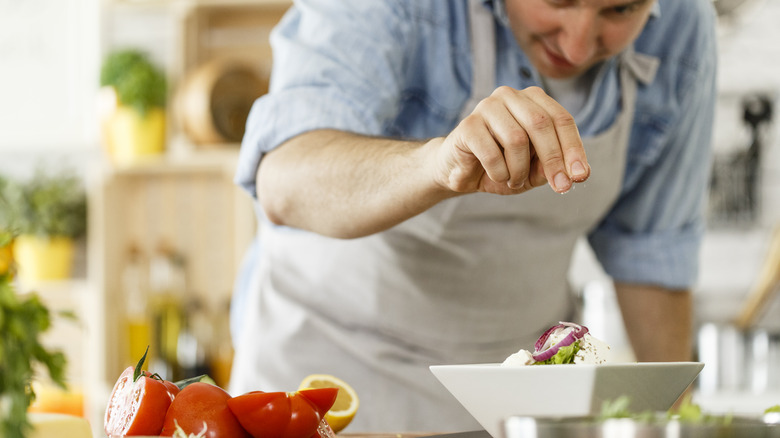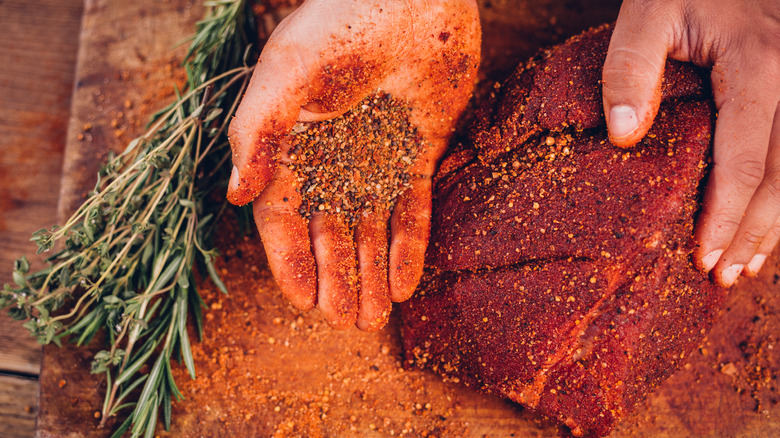The #1 Difference Between Home And Restaurant Chefs, According To Bobby Flay
Since the '90s, Bobby Flay has shared his culinary expertise with home cooks everywhere via cookbooks and the Food Network, and has seen his own share of how professional kitchens operate with his restaurants like Amalfi and Brasserie B. The dual dichotomy has given him perspective on what separates professional chefs from home cooks, and his response is simple—and attainable if you want to cook like a pro.
Sure, the fancy equipment and access to unique ingredients help, but that's not what sets the two camps apart. Flay asserts that the one thing home cooks can do to elevate their dishes to restaurant-level quality is to season food more. This begins with inexpensive pantry staples like salt and pepper and can include other spices, herbs, and zests that transform a handful of ingredients into a delicious, balanced dish.
When preparing pasta, for example, he says it takes more than a few teaspoons of salt to flavor the water. The water should taste like the sea, so the noodles are flavored from within, not relying on the perfect amount of sauce to make each bite delicious. Similarly, before grilling, meat should be aggressively seasoned on both sides. Some salt is lost during the cooking process, so it takes more than expected to make the final dish taste its best. As he tells Food & Wine, "go back into that dish and add a little bit more. It makes all the difference."
Tips for seasoning with salt
Salt doesn't just make food salty; it makes it taste better. As such, food should be salted at every stage, ensuring that each ingredient pulls its weight to make the dish taste its best. Waiting to season until the dish is done or seasoning just one side of the burger often leaves pockets under-seasoned, resulting in a bland bite or two ... or seven.
Bobby Flay's seasoning tip also encompasses raw produce. A sprinkle of salt can enhance the flavor of fruit and veggies, making restaurant salads infinitely tastier. Salt wakes up a cucumber or avocado, which could otherwise taste flat. Even though bacon is salty, seasoning the tomato before assembling a BLT is another difference between a good and a great sandwich. This isn't limited to savory foods, either. Salt brings out the sweetness in fruit and baked good recipes without anyone even tasting a trace of it in the final dish.
This is because seasoning with salt elicits a chemical change in food, allowing cooks to add another dimension of flavor to dishes. It draws out moisture, enabling proteins and vegetables to caramelize, introducing a new taste. A dish can taste delicious, seasoned with just the right amount of salt, whereas few taste as good without it.
Seasoning with spices and herbs
While many may argue that salt is the most essential seasoning ingredient, herbs (both dried and fresh) and spices season food by introducing another flavor, too. Bobby Flay loves to include chilis in his cooking, adding a layer of heat that isn't naturally present. Unlike salt, however, some seasonings should be added at a specific time, either at the beginning or end of the cooking process.
When using fresh herbs, woodsy varieties like rosemary and thyme should be added at the beginning of the cooking process since they are tough and can withstand high heat. These herbs can be fished out of a dish before consuming or minced and allowed to mellow so they aren't as intense. Similarly, dried herbs should be added early on to rehydrate the food. But, they lose potency and should be replaced often.
Delicate herbs like basil, parsley, and cilantro, on the other hand, break down when cooked too long, losing their color and potency. They are best added at the end or before serving to maximize flavor. Soft herbs are delicious raw in cold salads and offer brightness to cooked dishes when used as a garnish.
If you want to add heat to a dish, keep in mind that chilis get hotter over time, so add them early if you want the entire dish to be hotter. Fresh chilis can offer texture and gentle heat, whereas dried chilis are four times hotter. Although water has been evaporated, the chili's spicy chemical compound, capsaicin, concentrates and expands over time.



